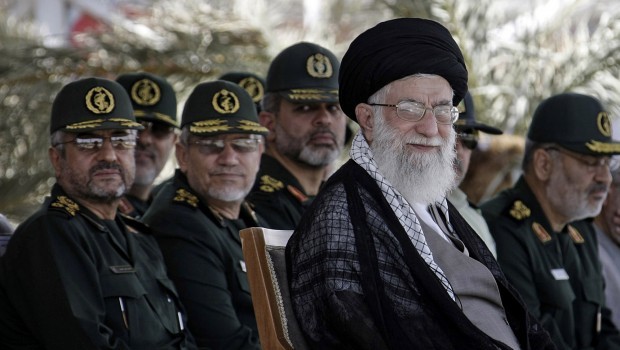
In this photo released by the official website of the Iranian supreme leader’s office, supreme leader Ayatollah Ali Khamenei, foreground right, attends a graduation ceremony of a group of Revolutionary Guard members, in Tehran, Iran, Monday, May 27, 2013. (AP Photo/Office of the Supreme Leader)
Speaking to a group of senior IRGC officers, Rouhani said: “As Imam [Khomeini] said during the [Iran–Iraq] War . . . the IRGC should not get involved in political games, as the body belongs to entire Iranian nation.”
Originally founded after the Iranian Revolution of 1979 to protect the new government from internal threats, the IRGC, whose leadership is known for its hardline conservative political views, is seen as a bulwark of Iran’s existing political system, and its associated militias have been used to break up and attack anti-government protests and gatherings of reformists.
It currently exists in parallel to Iran’s standard armed forces, and possesses its own naval and air forces, as well as large numbers of troops.
Rouhani, a relative moderate, also paid tribute to the organization, and said that that all Iranians should see the IRGC as their defender, in a possible attempt to pre-empt criticism of his remarks from his opponents among Iranian conservatives.
“The IRGC is not a force for war, but it is a force for security and peace,” he said.
He also addressed rumors surrounding the IRGC’s economic activities, dismissing claims that it has been a vehicle for corruption and gasoline and oil smuggling or using its political power to obtain lucrative contracts for firms linked to the organization.
“I asked the commander of the IRGC to take role in a few national projects,” he said, arguing that it was necessary for the IRGC to undertake some major national projects due to Western sanctions.
Meanwhile, some signs indicate that Rouhani’s comments were received coolly by organizations linked to the IRGC.
The semi-official Fars news agency—which is believed by many to be close to the IRGC—ignored the Iranian president’s comments on the need for the force to remain politically impartial, reporting only on the tributes he paid to its forces.
A report from the Fars News English Service said: “Rouhani underscored the Islamic Revolution Guards Corps’ might and power in defending the country’s territories and interests, but in the meantime said that the IRGC is a force to establish peace and not to ignite war in the region.”
Rouhani also addressed claims that the IRGC has been assisting Syrian government forces in the civil war currently raging in the country. Rouhani repeated Iranian denials, saying, “The Guards do not seek [to establish] military domination in the region.”
In the same address, Rouhani also spoke about Iran’s position on the ongoing Syrian crisis, saying that Iran’s efforts were aimed at re-establishing peace and stability in Syria and that Tehran will accept the wishes of the Syrian people with regards to their internal affairs.
“Whomever Syrian citizens vote for to rule their country, we’ll agree with it,” the Fars News Agency quoted Rouhani as telling the commanders.
“The dispute goes beyond [the control of Syria] and it is clear that the West has plans for the whole region,” Rouhani said. “The region’s destiny is linked to the Syrian issue,” he added.
